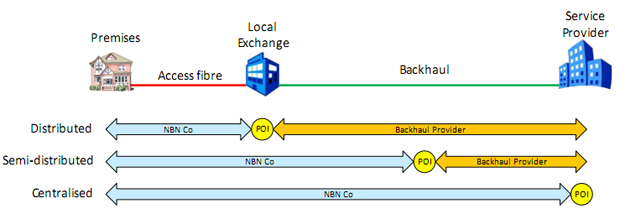NBN monopoly will mean compo: Optus

NBN Co is killing competition and opening itself up to compensation claims by not proposing enough points of interconnect for the National Broadband Network (NBN), according to Optus and Shadow Communications Minister Malcolm Turnbull.
In a discussion paper released last month, NBN Co proposed 14 points of interconnection (POI) located in Australia's major cities, with the option of an additional 195 POI in other locations around Australia as required.
The POI is where two networks meet and exchange information. For NBN Co it would mean where it passes on data carried over its networks to the internet service providers' networks. Where that is located determines how much backhaul a provider would have to supply themselves in order to connect customers to the NBN. How much backhaul the supplier has to provide has a significant impact on the price of the service it can offer consumers.

Possible POI for the NBN (Credit: NBN Co)
In Optus' response to the discussion paper, provided to ZDNet Australia today, the telco said that the proposal means more monopoly infrastructure than there currently is under Telstra's dominion.
"NBN Co has proposed a highly aggregated model for connecting to the NBN that would see interconnection practically offered at only a very small number of POIs located in each of the main capital cities. Optus is strongly opposed to this proposal since it will have a dramatic adverse impact on current and future investments and competition in the fixed line markets," the company said in its submission.
Optus said that if the POI is limited as has been proposed, it would undermine regional development, result in overbuild for the network, strand significant levels of existing backhaul infrastructure and would likely result in "significant claims for compensation, likely to run into hundreds of millions of dollars, in respect of that infrastructure".
In response, Optus said that — in line with the recommendations of the McKinsey KPMG implementation study — a minimum of 200 POI with the possibility of 400 POI across Australia would ensure greater competition in backhaul, and as a result, lower prices for consumers across the board.
The telco was also critical of the two-week time period the Australian Competition and Consumer Commission along with NBN Co gave to respond to the paper, describing it as "manifestly inadequate". Submissions on the paper are due today.
Optus' response was echoed by Turnbull.
"This hasty process has created regulatory uncertainty for investors in backhaul — particularly in rural and regional areas — which can only reduce capital spending and push up prices," Turnbull said in a statement.
"The National Broadband Network's plan to limit the number of points of interconnect on its network will strand hundreds of millions of dollars of existing private investment in fibre links between Australian towns and cities," he added. "The NBN's proposal will bypass infrastructure that has already been built by private companies. These links will be excluded from carrying fixed line traffic if the NBN's plans go ahead.
"Not surprisingly the owners of these networks have demanded that the NBN offer compensation."
Turnbull said the discussion paper underlined the Coalition's calls for a cost-benefit analysis of the $43 billion NBN project.
NBN Co was contacted for comment but had not responded at the time of writing.
A consortium of greenfield fibre providers has also asked for clarity around the extent of the NBN's coverage.